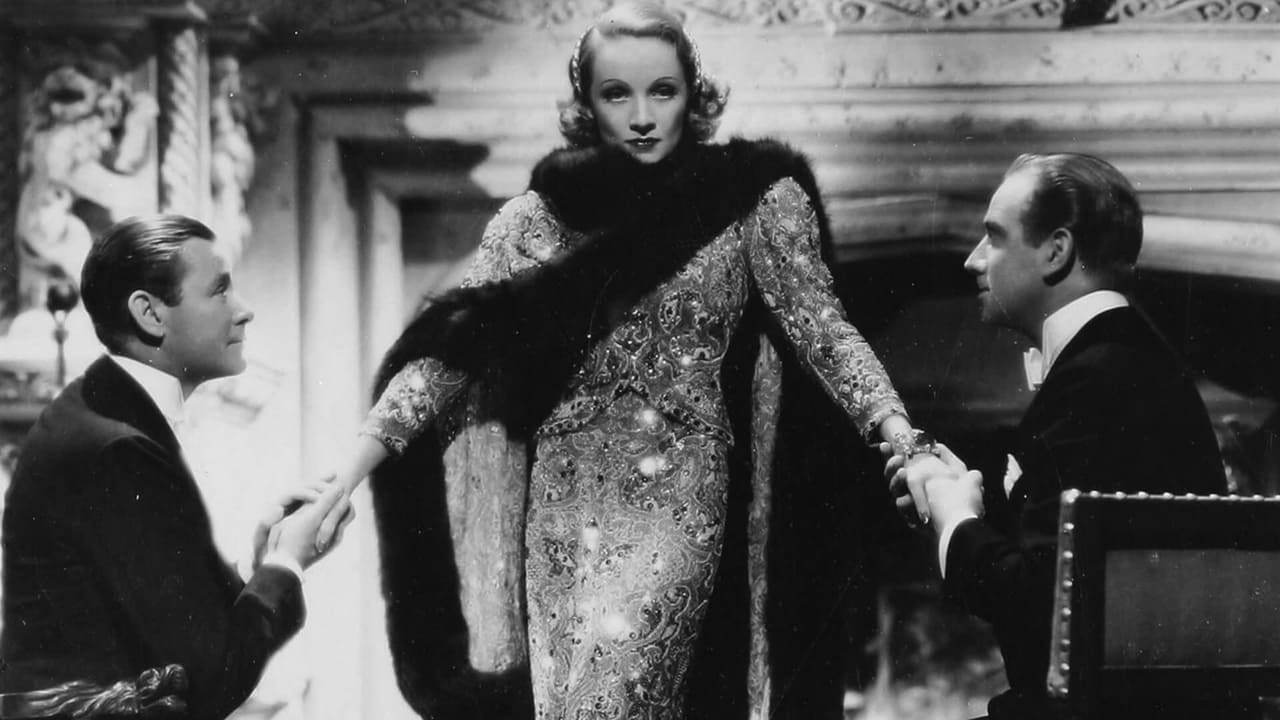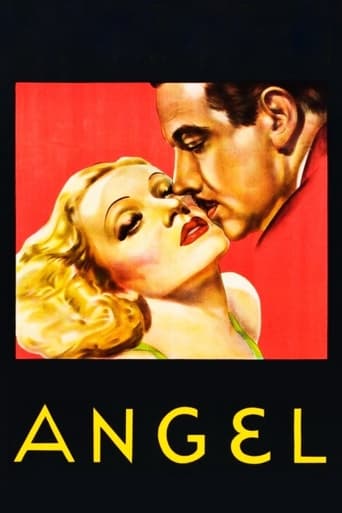

Although it has its amusing moments, in eneral the plot does not convince.
... View MoreFun premise, good actors, bad writing. This film seemed to have potential at the beginning but it quickly devolves into a trite action film. Ultimately it's very boring.
... View MoreI have absolutely never seen anything like this movie before. You have to see this movie.
... View MoreAlthough I seem to have had higher expectations than I thought, the movie is super entertaining.
... View MoreI've seen all of Lubitsch's films and I rate Angel as his worst. The faults are in a bland repetitive script and the strangely ambiguous, wooden performance of Marlene Dietrich. There are times she appears more masculine than her costars Melvyn Douglas and Herbert Marshall.The sexual playfulness and subtle daring - so delightfully evident in Lubitsch's other films - here often fall flat. Made a few years before Angel, one of Ernst Lubitsch's best films, also based on a play (Noël Coward's Design for Living), has a woman at the center of a love triangle. The shock, particularly for a 30s Hollywood movie, is that the three live together in a bohemian Paris flat. In his directing, as well as the performances of Frederic March and Gary Cooper, there is never a hint of homo-eroticism. Ironically in Angel the best scene, a climactic one between Douglas and Marshall, is full of sexual energy.Subtle sophistication was always an Ernst Lubitsch trademark. There is little evidence of sparkling wit and originality in Angel.
... View More"Angel" from 1937 is a Dietrich-Lubitsch collaboration that didn't come off - in fact, this was the last film Dietrich made for Paramount, after which she was labeled box-office poison. You can see why this film didn't help, though she is photographed like a dream and dressed divinely by Travis Banton.Based on a play, this is a rather dull story. The neglected, bored wife, Maria (Dietrich) of a very busy diplomat (Herbert Marshall) flies to Paris and goes to a salon run by a countess (Laura Hope Crews) who is an old friend of hers. It's apparently a high-class brothel. While waiting to see her, she meets Tony Halton (Melvyn Douglas), looking for a delightful evening. She agrees to meet him for dinner. The affair isn't shown, but one assumes they consummated their relationship. She disappears without telling him her name or her knowing his.Later on, he runs into an old friend, who is Maria's husband. Maria and Tony meet again - under awkward circumstances.This isn't a comedy, and it really isn't much of a drama either, with dull spots enlivened by the supporting cast - Crews, Edward Everett Horton, and Ernest Cossart, who plays the butler. (He tells his fiancée over the phone, "If you don't tell me where you learned to rumba, we're through.")Directed with the usual Lubitsch subtlety, this is just okay, lacking the bubbly champagne touch that made Lubitsch's work in films like "The Shop Around the Corner," "Ninotchka," "To Be or Not to Be" and so many other great films of his.
... View MoreImagine a movie set in Paris directed by Ernst Lubitsch, the masterful director of such Parisian sexual innuendo comedies as Ninotchka, The Love Parade, The Merry Widow (1934 version), One Hour with You, and Design for Living. Imagine as the male lead Melvyn Douglas, who was so great in Ninotchka. Imagine as the female lead one of the great European stars of the cinema, a magnificent beauty like Garbo or Dietrich. Imagine that it concerns a Russian countess living in exile in Paris.But don't imagine that it's another Ninotchka. Far from it. It's Angel, in which all those ingredients that two years later would go to make one of the great Hollywood comedies, with Garbo and Douglas directed by Lubitsch, instead made for one very dull semi-comedy.Where to put the blame? The script, certainly, which isn't funny and never seems to know where it's going. Are we supposed to sympathize with Dietrich's character because she's abandoned by her husband, or condemn her for considering infidelity? The men at Paramount who approved it, and who should have spotted a bomb in the making. It is seldom funny. We seldom care about the characters. (Why did Paramount keep starring Herbert Marshall in pictures? He is just not interesting.) One or two scenes are mildly clever, which was probably Lubitch's doing. The rest verges on stale melodrama. The end isn't convincing.Taken all together, I'd say forget it. This is one Angel that never takes flight.
... View MoreThe Lubitsch touch is omnipresent in this relatively unknown but extraordinary romantic comedy. The theme of a potential marital infidelity of a disaffected upper class wife (a gleaming Marlene Dietrich) is dealt with unusual sophistication and insight, building up slowly to a brilliant denouement, while the core dilemmas and the predicament of the main character are continuously and subtly underscored. The confrontations between the characters are a delight of restrained pathos, whereas Lubitsch, unsurprisingly, perfectly recreates a confined world of rigid social norms that suppresses any emotional profusion. All the performances are top notch, the secondary characters are equally memorable and the whole film is pervaded by the genius of one of cinemas most charismatic directors, Ernst Lubitsch. One wishes that modern romantic comedies had only maintained even a fraction of the wit and incisiveness that Lubitsch established as a norm in the 30s.
... View More